Summer learning
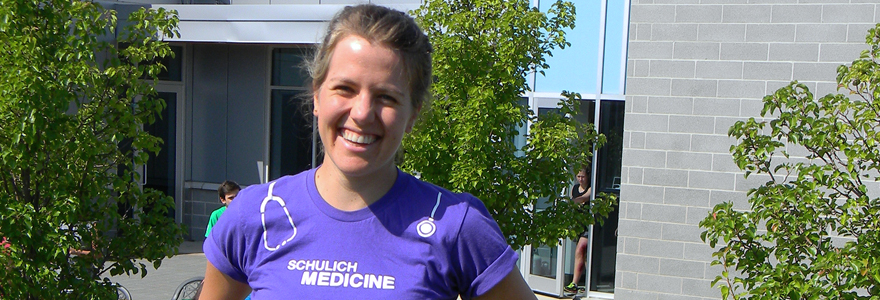
Each summer, Schulich Medicine undergraduate students venture off open to the possibilities electives offer. They return in the fall with greater confidence, increased self-awareness, and a better understanding of their future role as a health care provider
By Jennifer Parraga, BA’93
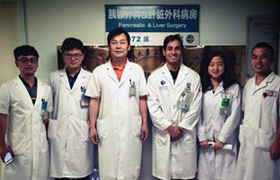 The living may be easy for some during the summer, but for first-, second- and third-year undergraduate medical students, the dog days of the season have become the perfect time to pursue electives.
The living may be easy for some during the summer, but for first-, second- and third-year undergraduate medical students, the dog days of the season have become the perfect time to pursue electives.
And with hundreds planned each year, the benefits of these electives are seemingly endless.
Students who choose clinical observerships are able to explore a variety of medical specialties, reinforce concepts learned in the curriculum, and improve their team and communication skills at sites in London, Windsor, across Southwestern Ontario, and around the world in places such as China and Africa.
“I wanted to put some of what I have learned in the classroom into action,” said Jessica Bryce, Medicine Class of 2018, explaining her decision to complete an elective as part of the Medical Learning in Community Settings (MedLINCS) program. A six-week program combining clinical training and teaching, MedLINCS offered Bryce the opportunity to experience health care in aboriginal and First Nations communities.
Working with community partners at Saugeen First Nation, Chippewas of Nawash and Urban Indigenous Youth, Bryce and 11 of her classmates shadowed physicians at the Grey-Bruce Health Services – Wiarton in emergency and family medicine. She also participated in community and youth engagement activities.
Struck by the broad and varied clinical experiences she observed, it was only a matter of days into the elective that Bryce was convinced that working in a rural, family medicine environment would be part of her future.
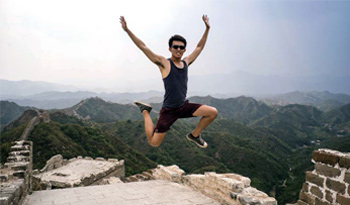
And during her newly-adopted routine of taking patient histories, practising physical exam skills and observing procedures, she discovered the art of medicine. “I learned that being flexible, open-minded and willing to ask for the perspective and opinions of others is important,” she explained.
With this patient-centred approach, Bryce also grew to appreciate the diversity among patients. “Each person has his or her own life story and circumstance,” she said.
The entire experience has made her even more enthusiastic for the years ahead. “Completing this elective has definitely made me more excited, confident and prepared for clerkship.”
Ahmad Al-Askar and Alex Xu, firstyear medical students, travelled to China on an adventure to broaden their horizons, and experience the practice of medicine in a completely different culture.
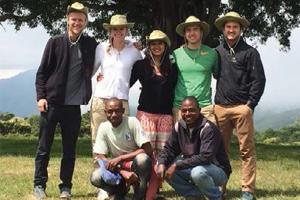 Whirlwind days of medical rounds, observing surgeries and shadowing during patient visits provided countless learnings for Al-Askar and Xu. However, witnessing the relationship between physicians and patients provided some of the most meaningful lessons. They both came to really appreciate the importance of trust in the patient-doctor relationship and how their listening skills are paramount when providing care.
Whirlwind days of medical rounds, observing surgeries and shadowing during patient visits provided countless learnings for Al-Askar and Xu. However, witnessing the relationship between physicians and patients provided some of the most meaningful lessons. They both came to really appreciate the importance of trust in the patient-doctor relationship and how their listening skills are paramount when providing care.
A similar international journey played out for Matt Douglas-Vail in Tanzania. Inspired by physician-humanitarians such as Drs. James Orbinski and Paul Farmer, it’s not surprising the second-year medical student embarked on a four-week global medical elective at Muhimbili Hospital in Dar es Salaam, the country’s largest city.
The language and cultural differences proved challenging, but he welcomed the chance to learn outside the classroom.
“This experience has given me a new appreciation for people who come to Canada for the first time, and are faced with a medical issue,” said Douglas-Vail. “I can understand so much more, now, how a language barrier can complicate an already delicate and difficult situation.”
Whether in the emergency unit or patient wards, Douglas-Vail and the seven other students who participated in the elective had the opportunity to interact with patients who had travelled hours and miles for care and required lengthy courses of medications.
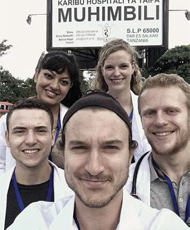 His greatest learning, however, came as a result of observing the similarities in the practice of medicine despite cultural differences. “The interaction and expectations of families in Tanzania and Canada may be very different, but Gitelman syndrome is the same regardless of location,” he explained. “Medicine creates bonds between people and cultures.”
His greatest learning, however, came as a result of observing the similarities in the practice of medicine despite cultural differences. “The interaction and expectations of families in Tanzania and Canada may be very different, but Gitelman syndrome is the same regardless of location,” he explained. “Medicine creates bonds between people and cultures.”
These types of insights and skills gained as a result of summer electives are life-changing says Dr. Gary Tithecott, associate dean, Undergraduate Medical Education.
“Each summer our students access opportunities to broaden their skills in our curricular competencies through the research and clinical electives we offer,” he said. “They return to us in the fall, with more confidence and a deeper understanding of diversity and the social determinants of health directing patient and family-centred care.”
Summer Electives at Schulich Medicine
Each medical student is permitted to take a maximum of three summer electives; each elective must be a minimum of
30 hours in duration
213
summer electives were planned by first-, second- and third-year medical students in 2015
12
students participated in MedLIN CS
8
students travelled to Tanzania
7
students travelled to China
2
students travelled to Hungary
1student travelled
|
1student travelled
|








